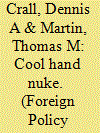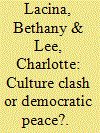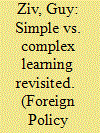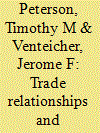|
|
|
Sort Order |
|
|
|
Items / Page
|
|
|
|
|
|
|
| Srl | Item |
| 1 |
ID:
120979


|
|
|
|
|
| Publication |
2013.
|
| Summary/Abstract |
How does presidential framing and signaling of problems affect the potential solutions available to solve those problems? For example, the Cuban Missile Crisis was immediately labeled a crisis and limited alternative solutions. Conversely, the Cienfuegos submarine base dilemma of 1970-despite having graver potential consequences-was never framed as a crisis, was out of the public eye, and was equally successful at repealing a Soviet threat. We offer a Force Dilemma model that suggests the president's problem definition process should produce crisis classifications sparingly, considering and employing less confrontational instruments of power, without prematurely sending unnecessary signals to adversaries, contemporaries, and the public.
|
|
|
|
|
|
|
|
|
|
|
|
|
|
|
|
| 2 |
ID:
120976


|
|
|
|
|
| Publication |
2013.
|
| Summary/Abstract |
We extend the logic of the democratic peace to query whether information about a foreign country's regime type affects US citizens' opinions of that country. We contrast this with the suggestion in other areas of international relations theorizing, such as the "clash of civilizations" thesis and constructivist frameworks, that a country's culture, especially its dominant religious tradition, may be more salient in citizen attitudes toward foreign countries. We designed a survey experiment to test the effects of randomly assigned cues regarding the regime type (democracy/nondemocracy) and religious culture (Islam/Christianity) of a foreign country on respondents' attitudes. Religious cultural cues outperformed regime type cues in determining respondents' perceptions of threat or expressions of trust, but respondents' views did not conform to maximalist claims of either the democratic peace or the clash of civilizations frameworks. These findings suggest that the need for a more synergetic approach to understanding the microfoundations of public foreign policy opinion formation.
|
|
|
|
|
|
|
|
|
|
|
|
|
|
|
|
| 3 |
ID:
120975


|
|
|
|
|
| Publication |
2013.
|
| Summary/Abstract |
Despite recent scholarly and popular work regarding the role of religion in US foreign policy, we still know little about how religious factors affect the public's foreign policy views. This paper proposes one potential mechanism for influence-the connection of providential beliefs to foreign policy issues through a compelling religious frame-and tests the explanatory power of this approach through a nationally administered survey experiment. The "providential" orientation of respondents-the extent to which they believe in a divinely authored plan-is measured through questions that tap the nondenomination specific nature of religious beliefs. A multi-methods approach of means comparisons, logit analyses, and exact logistical regression indicates that when a foreign policy is framed in religious terms, providentiality is a significant predictor of support, even in the face of countervailing political beliefs. These findings highlight one mechanism through which religion can influence foreign policy attitudes, thereby demonstrating the value of further investigating the role of religious beliefs in politics.
|
|
|
|
|
|
|
|
|
|
|
|
|
|
|
|
| 4 |
ID:
120980


|
|
|
|
|
| Publication |
2013.
|
| Summary/Abstract |
When does a decision-maker's shift on a major policy issue represent a genuine reassessment in his or her beliefs as opposed to tactical maneuvering? This article provides a framework to improve our confidence that a policy shift represents "complex learning," which entails the adoption of new goals, rather than "simple learning," which refers to a change in means but not goals. Challenging the conventional wisdom on learning, it argues that decision makers who alter their foreign policies incrementally are more likely to have had a fundamental rethinking of their underlying assumptions on a core issue than those who exhibit sudden shifts in their foreign policy decisions absent a traumatic event. The public declarations of Israel's three most recent premiers-Ariel Sharon, Ehud Olmert, and Benjamin Netanyahu-in support of the establishment of a Palestinian state are used to illustrate the utility of this framework. Whereas Sharon and Olmert underwent complex learning, Netanyahu's swift change appears to represent merely a tactical response to pressure from the United States.
|
|
|
|
|
|
|
|
|
|
|
|
|
|
|
|
| 5 |
ID:
120981


|
|
|
|
|
| Publication |
2013.
|
| Summary/Abstract |
In this paper, we demonstrate that dependence on trade influences asymmetric crisis perception. Unilateral crisis perception is more likely to persist when the initiator of the crisis does not depend on trade with the target because in this case the target lacks capability to harm the initiator. Conversely, when the initiator is dependent on trade with the target, mutual crisis perception occurs sooner. Additionally, a state is more likely first to perceive a threat from another state-beginning a crisis as a target-when its trade dependence on that state is high. We find support for these expectations in survival time regressions and probit models spanning the period from 1919 to 2001.
|
|
|
|
|
|
|
|
|
|
|
|
|
|
|
|
| 6 |
ID:
120978


|
|
|
|
|
| Publication |
2013.
|
| Summary/Abstract |
Since the election of the Justice and Development Party (AKP) in 2002, Turkey has become the subject of increased attention from the US foreign policy community. Schools of thought range from those who argue that Turkey is "turning away from the West" to those who suggest that Turkey is pursuing a more autonomous foreign policy. One of the few things on which these schools of thought agree is that, if they are correct, we should be able to find these patterns in public opinion. Analyzing data from the Pew Global Attitudes Project, we find some differences in attitudes based on political party affiliation, income and education, but the results generally refute the argument that Turks see a fundamental choice between East and West in their foreign policy or that supporters of the AKP have fundamentally different international outlooks. Taken together, these results have important implications for US policymakers.
|
|
|
|
|
|
|
|
|
|
|
|
|
|
|
|
|
|
|
|
|